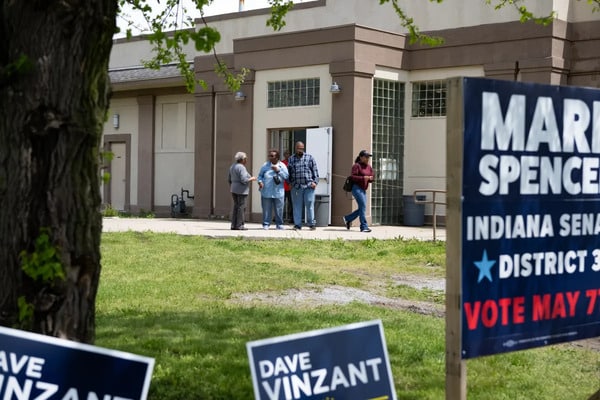
This story was originally published by Capital B Gary, a Free Press Indiana partner.
By Calvin Davis
Capital B Gary
May 24, 2024
As DeMondre Velez surveyed the County Market parking lot from his security post, the 24-year-old candidly shared why he skipped the polls in the most recent election. “I didn’t know what was going on for real,” he admitted.
Velez represents a growing trend among local Gary residents: a disconnection from the political process. Voter turnout in Gary has consistently declined, nearing a historic low this year, with only 14% of registered voters participating in the primary election, according to a Capital B Gary analysis of Lake County Board of Elections data. This stark drop from the 25% turnout in the 2020 primary represents nearly 6,000 fewer residents casting a ballot. Many residents attribute this disengagement to inadequate communication and outreach from candidates, leaving the youth feeling overlooked and uninformed.
“We’re in the day of social media, and you should have politicians walking out talking,” Velez told Capital B Gary. “If they want us to vote for them, they need to come out and support us. That’s how they get support. They gotta support us, and we’ll support them.”
Meanwhile, candidates are faced with tough decisions regarding where to spend time and resources, both of which are limited in most cases. Candidates and political strategists aim to spend those resources in places where they are most likely to see return on their investment. What results is a stalemate in which each side is waiting for the other.
Lower voter turnout could potentially dampen the enthusiasm candidates have for campaigning in the area, Stephen Mays, president of the Gary NAACP chapter, said.
“Voting commands respect,” he explained. “Why would someone want to campaign up here when you don’t vote? They take you for granted.”
Mays also highlighted a disconnect with younger voters, which compounds the problem. “Our older generation is the No. 1 demographic. We’re not making any traction with the younger generation,” he said.
Once renowned for Black political engagement, Gary now grapples with dwindling voter turnout. It’s a steep fall for a city that elected the first Black mayor of a major city in 1967. Then, in 1972, Gary served as host to the National Black Political Convention, which brought a “who’s who” of Black political leaders to West Side’s gymnasium to plot a course for Black political action.
But today, some residents believe the connection between past generations of Gary voters and younger generations is fractured.
“They’re stuck in that time,” Jeremiah King, founder of Building Leaders Advancing Community Knowledge, told Capital B Gary.
“They’re stuck in the tradition of that [time] as opposed to creating a new tradition and connecting generations. There was never a bridge built. That bridge doesn’t exist at all so there’s a huge disconnect between the 1970s and now.”
In King’s estimation, in the absence of traditional and historical points of entry, civic engagement in 2024 must be brought about organically.
“I said on Facebook it doesn’t feel like an election year,” said King. “So I see both sides, which in turn puts responsibility on not just the candidates but also the elders in the community who participate consistently to engage with the younger voters.”
“With all the information available, you have to make it relevant or cool. That’s the keyword. You have to make voting and being civically engaged cool,” King said.
Aside from the need to make civic engagement appealing to the youth, residents like 46-year-old Lance Sheppard said they feel detached from city affairs.
“The current state of this city, I really couldn’t tell you. I don’t know what our Cabinet’s politics look like. I don’t know what the officials’ agendas are,” Sheppard told Capital B Gary.
“I’m just a person living here, man.”
Not all absences from the polls were due to disinterest.
Shay Diaz, 30, who recently relocated from another state, referenced technical issues related to her photo ID.
“For the most part, just transferring the information, where I live and all that,” Diaz told Capital B Gary. “So when my ID came up, it posed a bit of a challenge. But for the most part, just the little small fires everywhere.”
Asked where she felt voter assistance for such issues should come from, Diaz replied, “I’m not sure, but somebody should definitely put some thought to it.”
Morgan Sheppard, 40, said she often experiences decision paralysis due to information overload.
“There’s too much information that’s not easy enough for me to understand what’s going on so that I can make an informed decision. So I make no decision.”